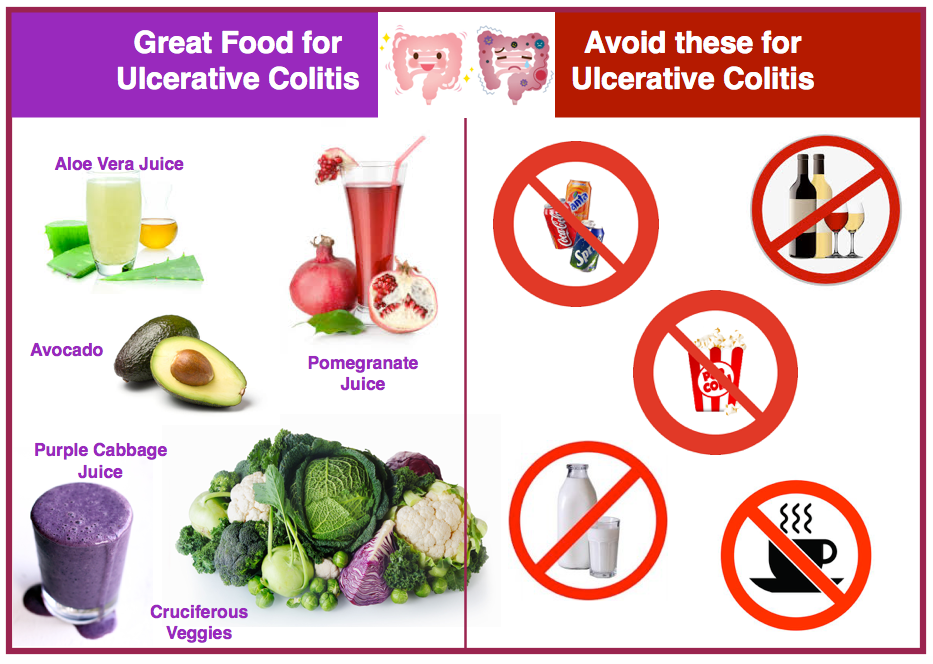Understanding Trigger Foods
One of the most critical lessons in managing ulcerative colitis is identifying and understanding trigger foods that may exacerbate symptoms or contribute to flare-ups. While trigger foods can vary from person to person, common culprits include:
High-fiber foods: Raw fruits, vegetables, nuts, seeds, and whole grains can be difficult to digest during flare-ups.
Dairy products: Some individuals with ulcerative colitis may be lactose intolerant or sensitive to dairy, leading to digestive discomfort.
Spicy or fried foods: These can irritate the digestive tract and worsen inflammation in individuals with ulcerative colitis.
High-fat foods: Greasy or fatty foods may trigger symptoms and contribute to diarrhea and discomfort.
Embracing a Low-Residue Diet
During flare-ups or periods of active disease, following a low-residue diet can help reduce bowel irritation and alleviate symptoms. A low-residue diet involves limiting or avoiding high-fiber foods and focusing on easily digestible options such as:
Refined grains: White bread, pasta, and rice are gentler on the digestive system compared to whole grains.
Well-cooked vegetables: Steamed or boiled vegetables without skins or seeds are easier to digest.
Lean proteins: Choose lean cuts of meat, poultry, fish, and eggs for a good source of protein without added stress on the gut.
Prioritizing Nutrient-Dense Foods
While managing ulcerative colitis, it’s essential to prioritize nutrient-dense foods that provide essential vitamins, minerals, and antioxidants to support overall health and well-being. Focus on incorporating the following foods into your diet:
Lean proteins: Chicken, turkey, fish, tofu, and legumes provide protein without excessive fat or fiber.
Fruits and vegetables: Opt for cooked or peeled varieties during flare-ups to minimize irritation.
Healthy fats: Include sources of omega-3 fatty acids such as fatty fish, flaxseeds, chia seeds, and walnuts for their anti-inflammatory properties.
Experimenting with Dietary Modifications
Every individual with ulcerative colitis may respond differently to various dietary modifications. Experimenting with different approaches, such as eliminating specific trigger foods, following a specific carbohydrate diet (SCD), or trying a low-FODMAP diet, can help identify what works best for managing symptoms and promoting gut health.
Practicing Mindful Eating
Practicing mindful eating involves paying attention to hunger and fullness cues, savoring flavors, and eating slowly to prevent overeating and promote digestion. Additionally, keeping a food diary can help track symptoms and identify patterns between dietary choices and symptom onset.
Seeking Professional Guidance
Lastly, it’s essential for individuals with ulcerative colitis to work closely with healthcare professionals, including gastroenterologists, dietitians, and other members of their healthcare team. These professionals can provide personalized guidance, dietary recommendations, and support to help manage symptoms, optimize nutrition, and improve quality of life.
Frequently Asked Questions (FAQs)
Can certain foods cause ulcerative colitis?
Ulcerative colitis is a complex condition with multifactorial causes, including genetic predisposition, environmental factors, and immune system dysfunction. While specific foods do not cause ulcerative colitis, certain dietary factors may trigger symptoms or exacerbate inflammation in individuals with the condition.
Is there a specific diet that can cure ulcerative colitis?
There is no one-size-fits-all diet for ulcerative colitis, as individual responses to dietary interventions can vary widely. While some individuals may find symptom relief with certain dietary modifications, such as eliminating trigger foods or following a specific dietary approach, there is currently no cure for ulcerative colitis.
Can probiotics help manage ulcerative colitis symptoms?
Probiotics are beneficial bacteria that may help promote gut health and balance the microbiome in some individuals. While some studies suggest that certain probiotic strains may offer symptom relief for ulcerative colitis, more research is needed to determine their effectiveness and optimal use in managing the condition.
Is it safe to take dietary supplements for ulcerative colitis?
Dietary supplements, such as vitamins, minerals, and herbal supplements, should be used with caution in individuals with ulcerative colitis. Some supplements may interact with medications or exacerbate symptoms, so it’s essential to consult with a healthcare professional before starting any new supplement regimen.
Can stress worsen ulcerative colitis symptoms?
Stress is known to impact gastrointestinal health and may exacerbate symptoms in individuals with ulcerative colitis. Practicing stress-reduction techniques such as mindfulness, yoga, meditation, and regular exercise may help manage stress and improve overall well-being.
Are there any new treatments or therapies for ulcerative colitis?
Research into new treatments and therapies for ulcerative colitis is ongoing, including novel medications, biologic therapies, and advanced surgical techniques. Individuals with ulcerative colitis should discuss treatment options with their healthcare provider to determine the most appropriate approach based on their specific needs and circumstances.
Q7: Can ulcerative colitis affect nutrient absorption? A7: Ulcerative colitis can affect nutrient absorption and utilization due to inflammation and damage to the intestinal lining. Individuals with ulcerative colitis may be at risk of nutrient deficiencies, so it’s essential to focus on consuming nutrient-dense foods and, if necessary, work with a dietitian to address any potential deficiencies through dietary modifications or supplementation.
Conclusion
Living with ulcerative colitis presents unique challenges when it comes to managing nutrition and overall well-being. By understanding trigger foods, embracing a low-residue diet during flare-ups, prioritizing nutrient-dense foods, experimenting with dietary modifications, practicing mindful eating, and seeking professional guidance, individuals with ulcerative colitis can effectively manage their condition and improve their quality of life. By adopting a personalized and holistic approach to nutrition and lifestyle, individuals with ulcerative colitis can optimize gut health, reduce symptoms, and promote overall well-being.
- Can THC Drinks Be A Safe Substitute For Alcohol? - May 9, 2025
- Forehead Frown Lines Treatment Near Weybridge, Surrey - May 9, 2025
- Baby Botox In St George’s Hill, Surrey - May 9, 2025


Leave a Reply